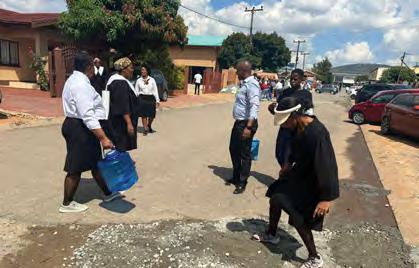
4 minute read
The Truth Is the Light
Rev. Dr. Charles R. Watkins, Jr., Columnist
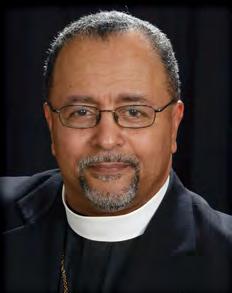
Advertisement
God loves us in spite of our faults. Knowing we are loved ought to make us more loving. John is trying to get us to understand the concept of agape love. In other words, God’s unconditional love for us is the same love we should express toward each other. Yes, it is love that goes against our carnal nature, which compels us to love only those who love us. In fact, it is the kind of love that says, “Love your enemies” and “Pray for those who despitefully use you.”
We are called to express agape love in challenging moments. We are encouraged to show an extra ounce of patience, sometimes speaking less and listening and loving more. Agape love calls us to a point when we might share more. Or, in our vengeful moments, agape love challenges us not to use it.
We will not know agape love unless we also know how to forgive. Agape love and forgiveness have to go together. The older saints remind us that it is near impossible to live in this world without getting bitten by one of Satan’s snakes. They warn us that “Hellhounds” are everywhere, riding the backs of the saved and the unsaved. The truth is if we are unable to return hate with love, we will soon find ourselves little more than a bitter wretch of a man or woman. We would rather be known for displaying the fruit of the Spirit, love, joy, peace, longsuffering, gentleness, goodness, and faith. We would rather be like Christ!
In our text, we find John masterfully unraveling the truth of our salvation. John reminds us that the magnificent God we serve expressed his love for us through the gift of Jesus Christ. He admonishes that we are to respond to that love by loving others. Later on, we find John expressing it in another way, saying to us, “Beloved, let us love one another: for love is of God; and everyone that loveth is born of God, and knoweth God. He that loveth not knoweth not God; for God is love.”
Based on Biblical Text: 1 John 3:18: Little children, let us love not in word or speech but in deed and truth. God speaking through the “love” disciple John, says, “Little children, let us love not in word or speech but in deed and truth.” Because John is so loving, his recorded words ring so sweetly. What John is trying to teach us is quite simple. He admonishes that if we say the blood of Christ has truly transformed us, the evidence of our transformation should manifest in how we treat our brothers and sisters. In other words, our transformed life ought to be a clear demonstration of love and compassion. From the beginning, God has challenged us to “love one another.” However, the truth is that we often find the untransformed attitude still prevalent. We are quick to judge, quick to condemn, and even quicker, it seems sometimes not to forgive. It appears that in too many instances, we exhibit, “I am not my brother’s keeper!” As a result, what should be a continuous and spontaneous love for each other sometimes appears not continuous or spontaneous. The love that identifies us as Christian needs to be pulled out of us as we must constantly be reminded that we should be putting the feelings of others ahead of our own.
We must understand that God is not happy when a person claims to be a Christian but is unloving. The text puts us on notice that salvation and hatred do not mix. We cannot love Christ and hate our brother.
In other words, if we make a claim, we should back it up. God tells us that it does no good just to tell him we love him; we should show him. Truly, actions speak louder than words. Don’t try to tell God we are a Christian. Show him! A Christian is validated by the quality of their character.
The questions for us to ponder are simple. How do we handle life’s abuses? Are we forgiving? Are we patient? Are we considerate of others’ feelings? Can the Lord depend on us to hold our tongue and express his love in deed and truth? Are we a true Christian?
If we say we have truly been transformed by the blood of Christ, the evidence of our transformation should manifest itself. Christ has forgiven us; we should surely forgive others. Christ has shown us mercy; we should, in turn, show it to others. God has been patient with us. The evidence of our transformation is that we are patient with others. God has blessed us to be a blessing to others. The Reverend Dr. Charles R. Watkins, Jr., is the pastor of James Chapel African Methodist Episcopal Church in Charleston, South Carolina.
Instead, the church moved from the comfort of the pulpit to the stre ets. Present was the Rev. Lekubela Simon Moobi, presiding elder of the Ga-Rankuwa District, who came not as a spectator but as a worker. This sterling work was witnessed and reported by the Herald Newspaper based in Rustenburg. The Rev. Moremi is grateful to Bishop Ronnie Elijah Brailsford for the 19 th Episcopal District’s four core principles: “Go to the people, Love the people, Serve the people, and Empower the people,” as well as Presiding Elder Mexico, who emphasises these four core principles during the quarterly conferences. These four core principles are what the Nkosi Memorial AME Church is built on, so their holy week was held at members’ homes rather than in the sanctuary to revitalise class meetings. ❏ ❏ ❏

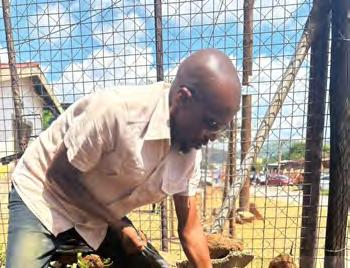
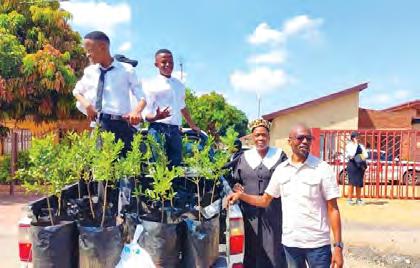

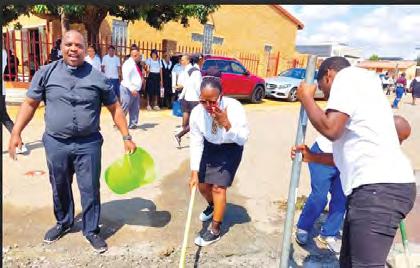
...From More Than p1 newer arena nearby.
According to historians, the Hill District was a center of black culture in the 20 th century, renowned for its jazz clubs and other cultural landmarks depicted in many of acclaimed playwright August Wilson’s works.
Bethel AME played an important role in that community. Founded in 1808, Bethel is regarded as Pittsburgh’s oldest black church. From its inception, it was involved in infant education and civil rights.
It opened a large brick church with rounded arches and a prominent tower in 1906 in the Lower Hill District, home to 3,000 members at its zenith.
In the 1950s, the Pittsburgh Urban Redevelopment Authority declared a large portion of Lower Hill derelict.
It oversaw the demolition of approximately 1,300 structures on 95 acres, displacing more than 8,000 individuals, more than 400 businesses, and numerous places of worship. Bethel congregants stated that the predominantly white Catholic church was not, however, demolished. Bethel’s leaders unsuccessfully battled the church’s demolition, ultimately receiving $240,000 for a $745,000 property.
The pastor of Bethel, the Rev. Dale Snyder, told The Grio , “This is a model for how we can heal the broken realities of America.”
The church intends to construct housing, a daycare center, and other potential commercial developments on the property.
The Rev. Prudence Harris, associate pastor, and lifelong Bethel member,









